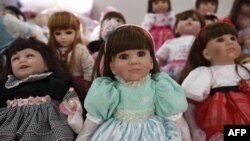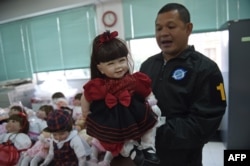Authorities and psychologists in Thailand are expressing concern over the increasing popularity of dolls believed to possess the spirits of child angels.
The dolls, known in Thai as luk thep and believed by some to bring their owners good fortune, are purchased for hundreds of dollars and blessed by Buddhist monks.
Doll popularity
Shops are selling clothing, jewelry and beauty treatments for the dolls. A buffet restaurant in the Thai capital offers children's meals for them.
Thailand's Civil Aviation Authority is expected to convene a meeting of airlines and airport operators this week to discuss the surging demand by passengers to take their dolls on board.
One domestic airline is already serving drinks and snacks to the dolls if their owners purchase a seat for them. In a memo to its staff, Thai Smile, a subsidiary of the national carrier Thai Airways, explained the dolls could be considered children as they had undergone a spiritual ceremony breathing life into them.
Their popularity increased after several Thai celebrities asserted their dolls had brought them luck.
If the dolls help their owners feel better then the fad is rather innocuous, according to Nattasuda Taephant, director of psychological wellness at Chulalongkorn University.
“But if it crosses the boundary of reality and they believe they can talk to the luk thep doll that would be something concerning in terms of mental health,” she told VOA on Tuesday.
Superstitions
Thai mental health officials have issued an appeal for people to adhere to mainstream religious values and shun such incredulous things. But the belief is rooted in ancient Southeast Asian superstitions.
“Luk thep dolls are a clever blend of superstition and the digital era,” said Jedsada Chokdamrongsuk, the director general of the mental health department under the Public Health Ministry.
Spiritual leaders in Thailand and other countries in the region traditionally took stillborns or removed dead fetuses from women's wombs, roasted the bodies and then blessed and covered them in gold leaf. In Thailand, such household divine effigies are known as kuman thong (for male figures) and hong phrai (for female ones).
The practice has largely stopped in the modern era, but some are concerned the dolls represent a return to a more superstitious age.
“I'm really wondering how part of Thai society has come to this point,” said Sermsuk Kasitpradit, a veteran editor and popular blogger.
“As a Buddhist I am feeling much shame as it it is totally against the teaching of our Lord Buddha who preached not to believe in superstition,” Sermsuk told VOA.
Criminal usage, drug smuggling
There are also concerns the modern incarnations may be put to nefarious use, according to authorities.
Nearly 200 "yaba" methamphetamine pills were found Monday stuffed into the chest of a girl doll that had been placed in a suitcase for retrieval in the Chiang Mai airport's parking lot, said police Lt. Col. Kom Chetkhuntod.
The dolls give criminals “a new way to smuggle drugs,” said police General Chakthip Chajinda who added he has instructed all officers at airport and border checkpoints to strictly screen dolls.
Police officers on Tuesday carried out raids in Bangkok against doll vendors suspected of evading import taxes.
Three vendors were arrested and authorities seized more than 100 luk thep dolls, mostly imported from China, according to police Col. Kriangsak Kanrayawattanajaroen, deputy commander of the Economic Crime Suppression Bureau.






